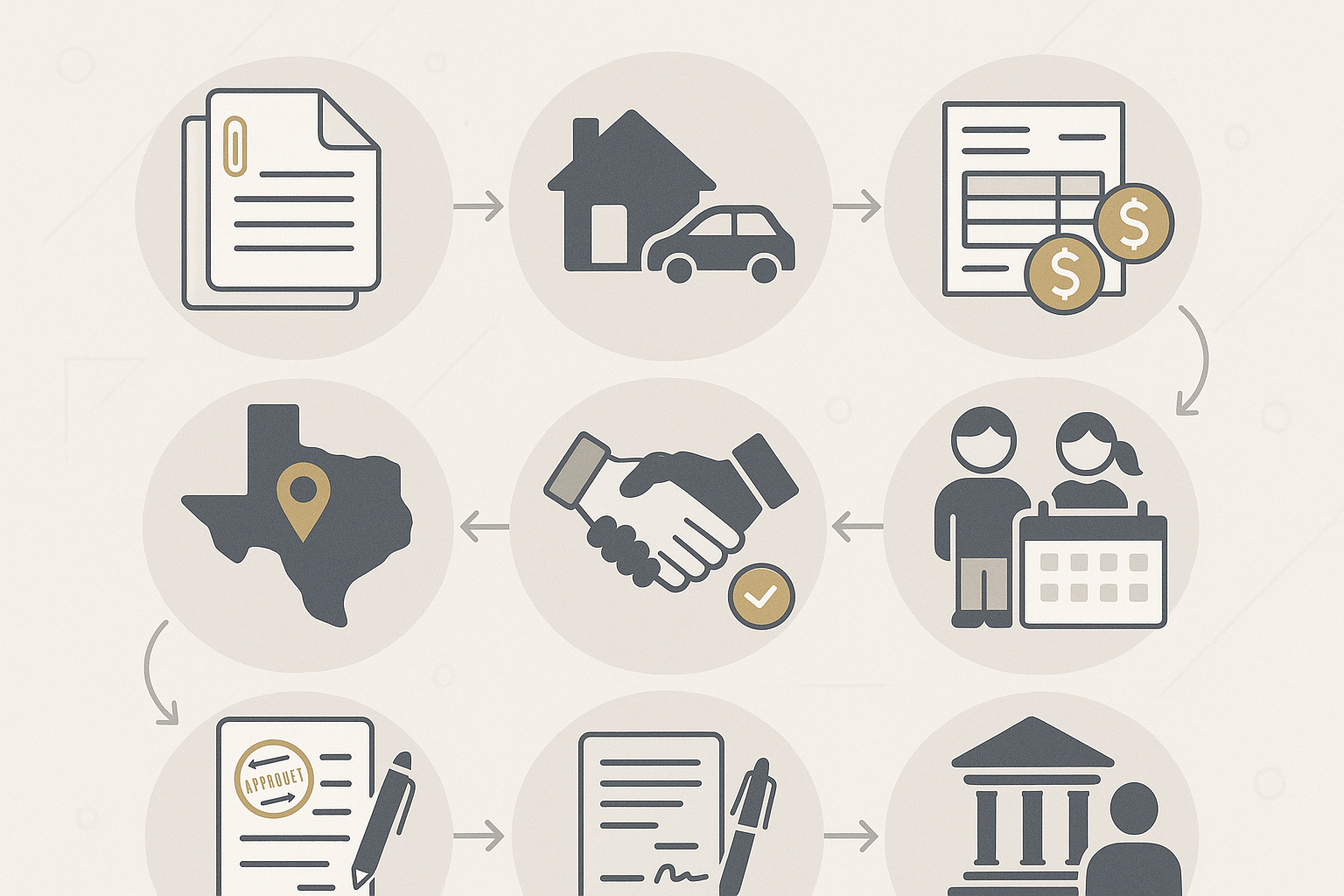Start Your Uncontested Divorce Journey in Plano, TX
Navigating a divorce can be emotionally and practically challenging. However, choosing an uncontested divorce in Texas, often leads to a more amicable and cost-effective outcome. At G.J. Chavez & Associates, P.C., we understand the importance of clear guidance and reliable legal support. Our guide empowers you to document evidence effectively, ensuring a smoother process and peace of mind as you move forward.

Understanding Uncontested Divorce in Texas
An uncontested divorce means both spouses agree on all major issues, such as property division, child custody, and support. While the process is more straightforward than a contested divorce, Texas law still requires thorough documentation and evidence to confirm that all agreements are legal and fair.
Why Documentation Matters:
Proper documentation protects your interests, supports your claims, and satisfies court requirements. Overlooking evidence can delay proceedings or result in unfavorable outcomes.
The 8-Step Guide: Documenting Evidence for an Uncontested Divorce in Plano, TX
1. Collect Personal Identification Documents
Begin by gathering essential identification records for both parties. These include:
- Driver’s licenses or state IDs
- Social Security cards
- Birth certificates (especially if children are involved)
- Marriage certificate
Having these documents ready ensures you can accurately complete all court forms and verify identities.
2. Compile Financial Statements and Records
Texas law requires full financial disclosure. Prepare:
- Recent pay stubs
- Tax returns (last 2-3 years)
- Bank statements
- Retirement account statements
- Investment records
This transparency supports fair asset division and prevents complications later.
3. Gather Proof of Property Ownership and Debts
Clarify all marital assets and debts to avoid disputes. Document:
- Real estate deeds or mortgage statements
- Vehicle titles
- Credit card statements
- Loan documents
- Lists of valuable personal property (furniture, jewelry, electronics)
Proper records make property division smoother and minimize misunderstandings.
4. Collect Evidence of Agreement on Child-Related Matters
If children are involved, document the agreed-upon custody, visitation, and support arrangements. Prepare:
- Child custody schedules
- Child support calculation worksheets
- Medical insurance details
- School and extracurricular activity schedules
Courts require these details to ensure the child’s best interests are protected.
5. Secure Proof of Residency and Jurisdiction
You must prove that you or your spouse meet the residency requirements for filing in Texas and specifically in Collin County (Plano).
- Utility bills or lease agreements showing residence in Plano, TX
- Mail addressed to you at your Texas residence
- Driver’s license with current address
This evidence confirms the court’s authority to handle your case.
6. Document Communication and Agreement
Keep written records of all agreements between you and your spouse. These can include:
- Email threads or messages confirming terms
- Written agreements signed by both parties
- Mediation summaries (if applicable)
Clear documentation reduces the risk of disputes and demonstrates cooperation.
7. Prepare Finalized Divorce Forms and Supporting Documents
Texas requires specific forms for uncontested divorces. Ensure you complete and organize:
- Original Petition for Divorce
- Waiver of Service (if spouse agrees)
- Final Decree of Divorce (with all agreements outlined)
- Child support and custody forms (if applicable)
Review all documents for accuracy before submission to avoid processing delays.
8. Consult an Experienced Plano Divorce Attorney
While uncontested divorces are more straightforward, legal guidance is invaluable. An experienced attorney, like those at G.J. Chavez & Associates, P.C., can:
- Verify all documentation is in order
- Provide personalized advice
- Represent you in court, if necessary
- Help file and track court submissions
Legal support ensures your interests are fully protected and the process remains stress-free.
Common Mistakes to Avoid When Documenting Evidence
Even in amicable cases, errors can occur. Watch out for:
- Missing or incomplete forms
- Failing to disclose all assets or debts
- Overlooking key residency or child-related documents
- Not having written proof of all agreements
Proactive organization and expert review are your best safeguards.
Why Choose G.J. Chavez & Associates, P.C. in Plano, TX?
With years of experience serving Plano and Collin County, our team prioritizes your success and well-being. We:
- Offer affordable, transparent legal fees
- Provide compassionate, individualized support
- Have a track record of favorable outcomes in Texas family law
Let us help you move forward with confidence.
Frequently Asked Questions About Uncontested Divorce Evidence in Texas
Q: What if my spouse and I disagree after starting the process?
If disagreements arise, you may need to transition to a contested divorce. Early communication and thorough documentation minimize this risk.
Q: Do I need a lawyer for an uncontested divorce?
While not required, having an attorney ensures all paperwork is correct and your interests are protected.
Q: How long does an uncontested divorce take in Plano, TX?
Most uncontested divorces are finalized in 60-90 days, provided all evidence and forms are complete.
Q: Can I file online?
Texas allows some filings online, but in-person signatures or appearances may be required.
Moving Forward With Confidence
Filing for an uncontested divorce in Plano, TX, is less daunting when you understand the documentation needed. By following these eight steps and seeking guidance from G.J. Chavez & Associates, P.C., you can ensure a smooth, efficient process and a brighter future ahead.
For more information or to schedule a consultation, contact G.J. Chavez & Associates, P.C.—your trusted partner in Plano, TX for all family law needs.
You might find interesting
- Understanding What to Expect in a Contested Divorce in Texas
- Essential Must-Know Legal Facts of the 10-Year Rule in Divorce in Texas
- Divorce Mediation or Litigation? Pros and Cons for Your Family’s Future
- What Happens During a Family Court Hearing? A Complete Guide to Divorce and Child Custody Cases
- Decisive Guide: Legal Separation vs. Divorce in Texas—Choose the Path That Protects Your Family
- uslawessentials
- https://statutes.capitol.texas.gov/






